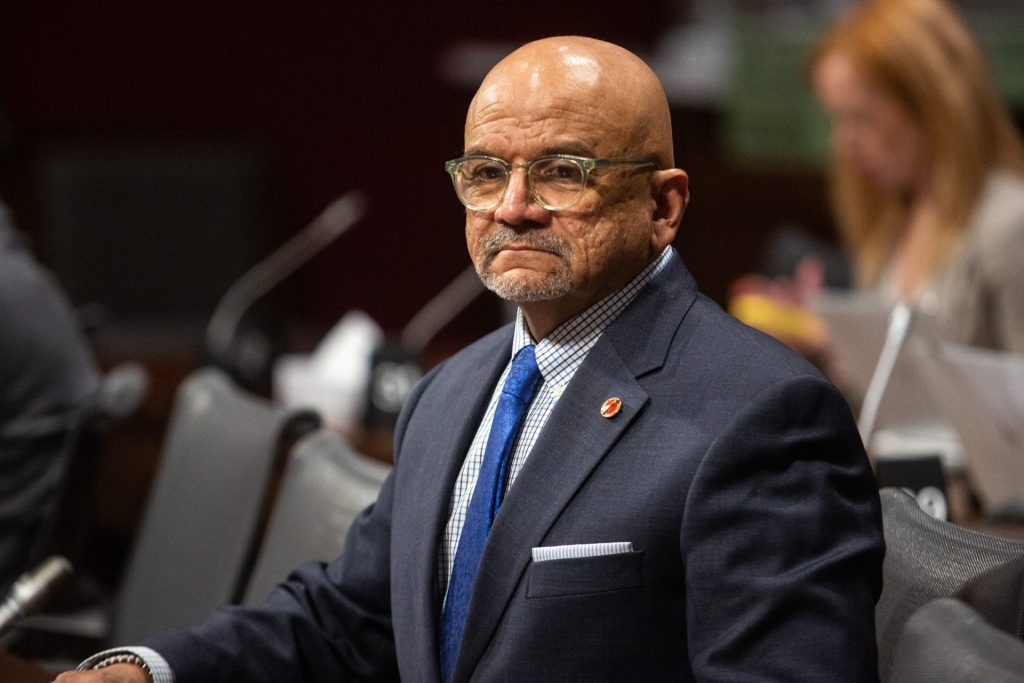Senate passes Bloc’s supply management bill on division as ex-diplomat warns law will ‘handicap’ negotiators

Senators fast-tracked a bill protecting supply-managed agricultural sectors from trade deals, passing it quickly on division this week, in a move one former diplomat warns could hamper ongoing and future trade negotiations.
The private member’s bill, C-202, faced an even speedier experience in the House of Commons. After it was tabled by Bloc Québécois Leader Yves-François Blanchet (Beloeil-Chambly, Que.) on May 29, it completed every other stage and was passed by the House as a committee of the whole in just one sitting on June 5.
The Senate approved it after a quick third reading on June 17, and the legislation now awaits royal assent to turn it into law. This is expected to happen next week.
“We have won,” Blanchet told reporters on June 18.
The bill prohibits the ministers for foreign affairs and international trade from making any commitments in a trade treaty that would increase the quota granted to countries to export more dairy products, poultry, and eggs to Canada, or lower the tariffs applied on these products if they exceed their limits.
Producers and distributors in these sectors from countries covered by trade agreements with Canada, like the United States, have to apply for the set quotas. Global Affairs Canada opened such applications for 2025-26 dairy tariff quotas on May 1, for example.
Colin Robertson, a former Canadian diplomat in Washington, D.C., previously said the bill would be a “red flag” in the current talks with the U.S.
After the bill’s Upper Chamber third reading, The Hill Times checked in again with Robertson, who said the legislation would “handicap” Canada’s negotiators in their trade discussions.
Canada could have offered to increase the tariff quota marginally in the trade deals with the United States or other countries to get more favourable terms for Canada for our exports in exchange for example, he explained. Granting higher quotas do not imply they will be used to the maximum. Robertson noted that the U.S. does not always use its current quota fully anyway, as demand for such imported products could also play into it.
But, the bill has blocked any such possibilities as it does not allow the set quotas to rise.
The decision made by Parliament to approve the bill was nonetheless “democracy in practice,” Robertson said, and it remains to be seen how Canada will work around the legislation in the future.
Supply management has been a sticking point in trade negotiations with the U.S. over the years. During Donald Trump’s first term as U.S. president in 2018, he demanded that Canada drop the protectionist system. Fast forward to 2025, and Trump has continued his attacks on supply management and complained that Canada does not let the U.S. sell more of its milk to the country.
A dispute over cheese, among other items, led to a breakdown of trade talks between the United Kingdom and Canada last year, too.
At the recent G7 summit in Alberta, Trump and Prime Minister Mark Carney (Nepean, Ont.) set a deadline of 30 days to complete negotiations around a deal to help bring down the current U.S. tariffs.
With Bill C-202 now passed by both chambers of Parliament, supply management may again become an area of complication if Trump, or other country leaders, hold their ground against the policy.
An identical bill tabled by the Bloc last year, Bill C-282, was stuck in the Senate’s Foreign Affairs Committee last year as Senators were divided over its implications. That committee proposed an amendment to exclude current and ongoing trade talks from the legislation, which was slammed by Blanchet at the time as a “stab in the back” of Canada’s dairy industry.

Senator Peter Harder, a former foreign affairs deputy minister, objected to the legislation last year, and said Canada’s supply management did not need protection through a bill. The legislation, he said during an April 2024 debate, was more about politics—especially Quebec politics—and backed by “one of the best lobbies in the country.”
“It appears to be another case of an unrealistic public and an overpromising political class,” said Harder, who is a member of the Progressive Senate Group (PSG).
Bill C-282 was wiped from the government’s legislative slate when Parliament was prorogued in January. It was reintroduced in the House by the Bloc this spring sitting.
Harder did not speak on the bill this week in the Red Chamber, but his PSG colleague, Senator Pierre Dalphond (De Lorimier, Que.), sponsored the legislation, and said Senators “have a responsibility to support the unity of the House of Commons” and “lend strength” to the government’s position.
“To delay passing Bill C-202 will send a contrary message and will weaken our position during the tough negotiations currently under way with our neighbours,” said Dalphond during second reading on June 12.
“To do otherwise would convey a message of division to the American administration and also suggest to Canadians that the personal views of unelected Senators should prevail under any circumstances, regardless of the cost to the country.”
Dalphond acknowledged supply management is an “important policy in Quebec,” and said its introduction by the Bloc “is a good indication of supply management’s importance to Quebec’s rural economy and our way of life.”
During this bill’s third reading debate in the Senate on June 17, Independent Senator Paula Simons (Alberta) questioned what signal the legislation would send to Canada’s trading partners while the country is trying to diversify trade to new markets, and said it does nothing for national unity.
“It does seem strange to allow a separatist party to set Canada’s national trade policy to such an extent, and at the expense of Western Canadian producers and agricultural exporters,” she said.
“Separatist rhetoric in my own province of Alberta is, sadly, growing louder and more strident,” she said. “It would be bitterly ironic indeed if, in a bid to keep Quebec separatists happy, we ended up playing right into the hands of the separatist lobby in Alberta and Saskatchewan.”

PSG Senator Andrew Cardozo (Ontario) told The Hill Times that he voted in favour of the bill, saying some values and practices important to Canada should be protected.
“If Canada does not want to be the 51st state, it should stop behaving like one. We can’t not take these decisions on the basis that it will offend Donald Trump.”
International Trade Minister Maninder Sidhu (Brampton East, Ont.) said to The Hill Times during a scrum on June 17 that the government will “always protect supply management,” and noted that the House had given unanimous consent for the bill.
The Senate passed the bill on June 17 on division, which means some Senators were against Bill C-202, but, with no standing vote, it’s unclear how many they number.
A version of this piece first appeared in Politics This Morning, your go-to source for insider news, analysis, and updates on where all the key political players are that day. Get more insider coverage directly to your inbox from The Hill Times‘ editor Peter Mazereeuw and reporter Riddhi Kachhela in this subscriber-only daily newsletter. Sign up here.
The Hill Times





 LICENSING
LICENSING PODCAST
PODCAST ALERTS
ALERTS













